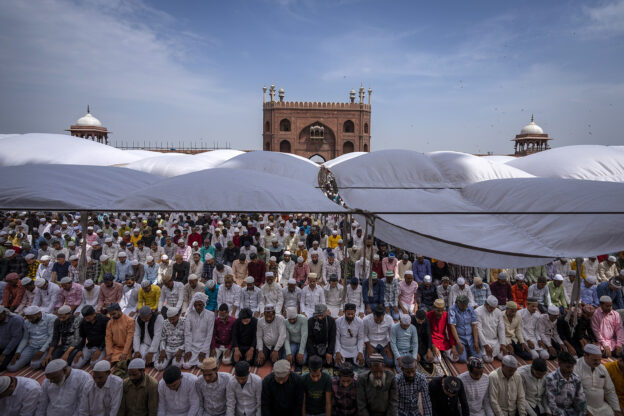
(RNS) — It may seem strange to anyone unfamiliar with Ramadan that, in the final stretch of this already demanding month, Muslims intentionally make it harder.
In the first 20 days of Ramadan, we fast from dawn to sunset, abstaining from food, drink and physical desires. It’s a daily battle of the will. But in the last 10 nights, a new struggle begins, one that’s perhaps even more difficult for many: We give up sleep.
The climax of the last 10 days comes on the 27th night of Ramadan — this year, on Wednesday (March 26) — in the United States. It is remembered as the night when the angel Gabriel began to reveal the first verses of the Quran to the Prophet Muhammad (peace be upon him), a moment of deep significance for many Muslims around the world called Laylat al-Qadr, or “Night of the Decree.” We cannot, of course, definitively locate this moment in time, but the traditional Laylat al-Qadr draws the largest crowds to mosques, and across the globe, millions of Muslims will be forsaking their beds, standing shoulder to shoulder, seeking something eternal in the quiet of the night.
Laylat al-Qadr is described in the Quran as “better than a thousand months.” It is the night when destinies are written, when the veil between the heavens and the earth feels thinnest, when mercy is abundant and the heart can find its way home again.
There’s something deeply powerful about what happens during these 10 nights. Around the world, in mosques and in homes, in cities and in refugee camps, Muslims are awake. Some are pacing quietly in prayer. Others are sitting with the Quran, reading until their eyes blur. Some are standing in long units of prayer, reciting chapter after chapter, with only the occasional whisper of “Ameen” breaking the silence. And others are crying — out of exhaustion, yes, but also out of love for God.
There is power in conquering hunger and thirst, in saying no to our impulses during the day. But there is a different kind of power in choosing wakefulness when every part of your body pleads for sleep. It’s a surrender not just of physical needs, but of control. It is, in a sense, the purest act of worship, driven not by compulsion or spectacle, but by devotion alone.

A Muslim worshipper offers a pray during the Muslim holy fasting month of Ramadan at Suleymaniye mosque in Istanbul, April 5, 2023. (AP Photo/Francisco Seco)
Most people assume faith is built to comfort the believer. In reality, faith is often revealed through sacrifice. And in Islam, these final nights are an invitation to sacrifice rest in pursuit of a deeper restfulness.
There’s a line in the Quran that describes the faithful as those whose sides “forsake their beds” while they call upon their Lord in fear and in hope. It’s a quiet image, but a powerful one. To give up sleep is to let go of the ego’s last demand. To stay awake for prayer when the world is asleep is to make space for something greater to rise in you.
And yes, it is exhausting.
Some nights, your body fights you. You begin your prayer and wonder how you’ll make it through. Your back aches. Your eyes burn. The bed calls. But somehow, you push through, and in those moments, something changes. You begin to feel that there is a stillness in the night that the day does not offer. A clarity. A closeness to the divine. The peace that every soul is chasing in a chaotic world suddenly feels near.
In that moment, you realize that it wasn’t the food, or the drink, or the sleep that sustained you. It was something else entirely.
For Muslims, Ramadan is not just about deprivation. It’s about liberation from the self, from distractions, from everything that keeps us distant from God. In the first 20 days, we learn discipline. In the last 10, we learn surrender, the meaning of the word “Islam” in Arabic.
And surrender is not a passive act, it is a transformative one.
So, if you see Muslims looking weary on the 27th night of Ramadan, know that it’s not just physical fatigue. It’s the weight of spiritual striving. It’s what it looks like to seek something beyond this world.
The world teaches us to conquer with strength. Ramadan teaches us to conquer through submission.
And sometimes, the most powerful thing a soul can do is stay awake. Not for work, not for ambition, not for fear, but for love.
